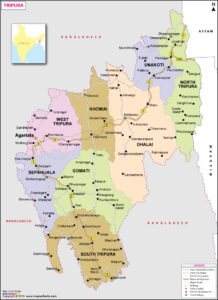‘Guns of Navarro’ are deadlier than militants’ AKs
Let’s call it the “Guns of Navarro.”
For over a year now, TIPRA Motha ‘warriors,’ led by their supremo Pradyot Kishore Debbarma, have generously branded all Bengalis in Tripura as “Bangladeshis.”

The timing could not have been more theatrical. With the state and central governments busy identifying and deporting actual illegal immigrants—most undeniably from Bangladesh—the overenthusiastic foot soldiers of Motha decided to skip the details. Why bother with history, legality, or nuance when you can sweep the entire Bengali population into one convenient “Bangladeshi” basket? Leaders like David Murasingh are already waving this rhetorical sword with pride.
A neat trick. Just draw a line at 1971—like a school project deadline—and declare anyone crossing after that as an outsider. Simple, right? Except history doesn’t really bend that easily. Anyone trying to point out inconvenient truths risks spoiling the slogan party.
For Bengalis across the state, the remark isn’t just insulting. It’s a deliberate, calculated attempt to stoke communal divides. Their anger is visible—in aggressive counter-statements, street protests, and fiery social media duels.
Branding Bengalis as “Bangladeshis” while elevating all indigenous groups as bhumipura sounds clean enough—until you scratch the surface of Tripura’s past. Archaeological remains from Boxanagar and Pilak, copper plates, clay tablets, and ancient coins all testify to the deep cultural and political presence of Bengalis in this land. Buddhist and Hindu kingdoms like Samatata, Pattikera, and Herikela tied Tripura’s plains firmly to Bengalis centuries before “Bangladesh” or even East Pakistan existed.
But such details are inconvenient for architects of the current narrative. Why let history spoil a political slogan?
What TIPRA Motha is doing has a strange resemblance to Peter Navarro—Donald Trump’s trade aide—who recently declared that every Indian business tycoon was a “Brahmin.”
Only two days ago Peter Navarro fired some surprising salvos that every Indian business moguls is a “Brahmin”. For him Tata, Ambani, Azim Premji et al are Brahmins too. Navarro’s ignorance was so pure it could be bottled and sold. Navarro thought he was being clever by using the word “Brahmins” as shorthand for India’s “elite oppressors”. Navarro, in his infinite wisdom, was evidently blissfully unaware of the layered meaning of Brahmins in Indian society. He was also evidently unaware of the fact that his faux pas was going to have serious implications. You may blame it on the general knowledge limitations of the USA leaders and public in general, but fact remains that by using the word ‘Brahmmins’ he was giving expression to a particular ‘idea’. Brahmmins here is in a sense used as a metaphor. The point was not accuracy, but the metaphor to which he was trying to give an expression. For him it is a punchy insult, but what he ended up was producing a world-class stupidity. But, the problem is when an educated person having a senior and responsible position spreads an idea from absolutely and seriously wrong premise it will have a very grave implication too.
Some years ago I watched a film ‘Ironman’ where the villain Obadiah Stane (played by Jeff Bridges) tells Tony Stark ( Robert Downey Jr) : “You really think that just because you have an idea, it belongs to you?” . We just take a simple liberty to paraphrase it -when you let your ‘Idea’ go to public, it does not anymore belong to you. It becomes public property. It mutates, it acquires a tailspin, and it can come back riotously insane.
In Tripura, the “Bangladeshi” label has escaped Pradyot Kishore’s speeches—sometimes subtle, sometimes openly communal—too and entered the bloodstream of his supporters. What might have been intended as a political provocation has become public property, repeated like gospel by people armed with half-baked history.
And so, TIPRA Motha’s “warriors” are weaponizing stupidity with the finesse of seasoned militants.
Pradyot Kishore himself has not shied away from adding fuel. His recent jab at Amara Bangali members—“Once in a while come out and bark on the streets of Agartala”—was less a political remark and more a deliberate innuendo—the expression ‘barking’. Unsurprisingly, Bengalis found it derogatory and communal.
But when have political slogans ever sought the approval of their targets?
The irony is thick. While Motha leaders flaunt pride in Tripura’s indigenous past, their followers betray stunning ignorance of that very history. The kingdom of Tripura didn’t begin with Chakla Roshnabad revenue records or the refugee influx of 1971. It stretches even before the first Manikya king Ratna Manikya’s reign in 1462 and to a wider network of Hindu-Buddhist states spread across present day Tripura’s plains spreading to Comilla, Noakhali, Chittagong, Sylhet and beyond. .
East Pakistan and modern Bangladesh are but fleeting chapters in this much older story. But such truths rarely go viral on Facebook.
For now, the reality is stark: Tripura’s Bengalis, across class and political lines, increasingly feel targeted. The endless hammering of the “Bangladeshi” label is carving fault lines deep into the state’s fragile social fabric. If unchecked, this rhetoric could fracture Tripura into antagonistic camps, with all political forces paying the price.
When the line between “idea” and “insult” blurs, history has a way of striking back. And Tripura’s history is both deeper and sharper than careless slogans suggest. The writing on the wall is visible and aggressive Bengali social media feeds should not be taken lightly. And history, unfortunately, has an unforgiving way of reminding us what happens when rhetoric goes unchecked or the power that be seeks to send it under the carpet.
The irony? TIPRA Motha’s “Guns of Navarro” may yet prove more dangerous than the AK-47s once brandished by ATTF or NLFT militants.
|Also Read : Hindus who came from B’desh till 2024 allowed to stay in India |
|Also Read : Foreign minorities who came to India before 2025 don’t need passport to stay|
Also published in the Tripura Times.













